#The Last Black Man in San Francisco
Explore tagged Tumblr posts
Text










film diary - 4/? the last black man in san francisco (2019) dir. joe talbot
you don't get to hate it unless you love it.
#the last black man in san francisco#san francisco#dailyflicks#cinematv#filmedit#filmtvcentral#fyeahmovies#cinemapix#filmtvtoday#movieedit#tvfilmedit#filmgifs#userblorbo#userdiana#nessa007#useraurore#*mine#*filmdiary
217 notes
·
View notes
Text
Name 10 Favorite Movies with GIFs!
I was tagged by @caffeinewineo and thought this would be fun! I have a shit ton of movies and TV shows that I love! The ones below are some of the movies I've seen multiple times.
Sing Street

2. Fantastic Mr. Fox

3. Lord of the Rings: The Fellowship of the Ring

4. The Iron Giant

5. The Wiz (1978)

6. The Last Black Man in San Francisco

7. Beauty Shop

8. Coraline

9. Stick It

10. Kiki's Delivery Service

In terms of tagging: @cakechase @luckeyzs @aaronieros @treegender @ebonysquib @postmodern-metal-kettle @bitchqueenofthebitchsquad
I'm sure anyone who sees this is free to do their own as well!
#Sing street#fantastic mr fox#lord of the rings#the iron giant#the wiz#the last black man in san francisco#Beauty shop#coraline#Stick it#kiki's delivery service#JarShi speaks
24 notes
·
View notes
Text
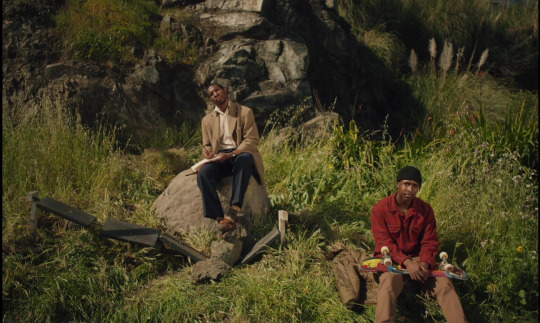


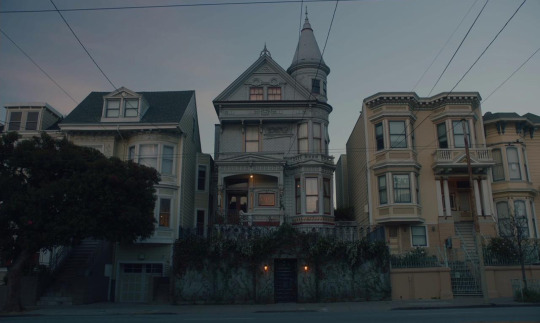

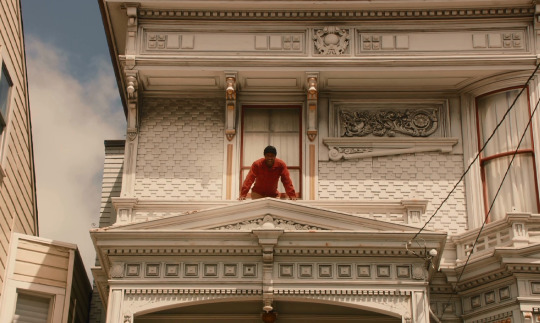
a film a day.
‘the last black man in san francisco’ (2019) dir. joe talbot
letterboxd rating: ✭ ✭ ✭ ✭ ½
211 notes
·
View notes
Text




The Last Black Men In San Francisco (2019)
dir. joe talbot
#the last black man in san francisco#movie still#joe talbot#movie#drawings#jonathan majors#old house
39 notes
·
View notes
Text










THE LAST BLACK MAN IN SAN FRANCISCO, 2019
Joe Talbot
11 notes
·
View notes
Text



The Last Black Man in San Francisco
[ Joe Talbot • 2019 ]
8 notes
·
View notes
Text
For Black History Month this year I decided to watch a few impactful documentaries and movies representing the ART that is US. IThe struggles and the joys of Black lives. This is IMPACT and This is REFLECTION.



























In no particular order:
Donyale Luna: Supermodel
Love to Love You, Donna Summer
Little Richard: I Am Everything
I Am Not Your Negro
Brother Outsider: The Life of Bayard Rustin
In Our Mothers' Gardens
The Black Godfather
Toni Morrison: The Pieces I Am
Mavis
Quincy
TINA
Miles Davis: Birth of the Cool
See It Loud: The History of Black Television
Is That Black Enough for You?!?
Going to Mars: The Nikki Giovanni Project
The Last Black Man In San Francisco
Dionne Warwick: Don't Make Me Over
Ma Rainey's Black Bottom
Ma Rainey's Black Bottom: A Legacy Brought to Screen
What Happened, Miss Simone?
Roxanne Roxanne
BILLIE
The Forty-Year-Old Version
The Perfect Find
Get On Up
Rye Lane
Rustin
#id love to discuss any of these#black history month#Donyale Luna: Supermodel#Love to Love You#Donna Summer#Little Richard: I Am Everything#I Am Not Your Negro#Brother Outsider: The Life of Bayard Rustin#In Our Mothers' Gardens#The Black Godfather#Toni Morrison: The Pieces I Am#Mavis#Quincy#TINA#Miles Davis: Birth of the Cool#See It Loud: The History of Black Television#Is That Black Enough for You?!?#Going to Mars: The Nikki Giovanni Project#The Last Black Man In San Francisco#Dionne Warwick: Don't Make Me Over#Ma Rainey's Black Bottom#What Happened#Roxanne Roxanne#BILLIE#The Forty-Year-Old Version#The Perfect Find#Get On Up#Rye Lane#Rustin
3 notes
·
View notes
Text
Film Journal
"The Last Black Man in San Francisco" by Joe Talbot

3 notes
·
View notes
Text


A24 - Jimmie Fails Tee - 2019
Every frame of The Last Black Man in San Francisco is a work of art.
Illustration by Akiko Stehrenberger.
#movie#the last black man in san francisco#san francisco#t shirt#a24#a24 films#Akiko Stehrenberger#2019#black#jimmie fails#joe talbot#jonathan majors#rob morgan#tichina arnold#mike epps#finn wittrock#danny glover
2 notes
·
View notes
Text
youtube
This 2019 cover of "San Francisco" (originally by The Mamas and The Papas, 1966) is one of the most incredible covers I've ever heard
(I wanted to embed Spotify but it looks like Spotify doesn't let you embed full-length songs anymore?)
5 notes
·
View notes
Photo
@intraosseous


The Last Black Man in San Francisco (2019)
dir. Joe Talbot
948 notes
·
View notes
Text
Small Isles Interview: A Blurry Ecosystem
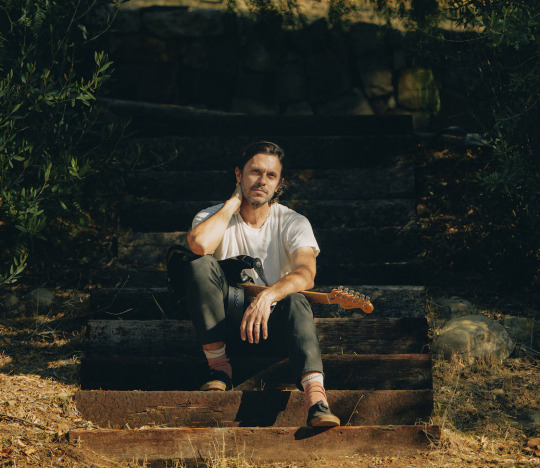
Photo by Dustin Aksland
BY JORDAN MAINZER
Sometimes, dreaming big pays off--literally, in Jim Fairchild's case. The former Modest Mouse and current Grandaddy lead guitarist and now prolific film composer has been releasing music with collaborator Jacob Snider over the last few years under the moniker Small Isles. The project's debut LP, The Valley, The Mountains, The Sea, was a score to something that didn't tangibly exist: an imagined Rick Moody-written sequel to The Ice Storm adapted into a film by Ang Lee. When I spoke with Fairchild and Snider in 2021, they mentioned collaborating with string player Sienna Peck on an upcoming EP. What I couldn't have foreseen was Fairchild's ultimate endgame: for his imaginary film scoring and real film scoring to develop a symbiotic relationship.
That is, at this point, Fairchild is able to use what I called "filmless music" as a starting point. He'll imagine a film, score it, see where it takes him, and either scrap it, use it for the Small Isles record he's currently working on, or even use it for the real film score he was hired to do. Other times, his professional film scoring will yield sounds that are appropriate for the heady universes he's conjured with Small Isles. Last year, Small Isles released two EPs. The first, which was the Peck collaboration the duo spoke to me about a few years back, was Out in The Sunset, a score to an imagined follow-up to Joe Talbot's The Last Black Man in San Francisco. And the latest, Everything on Memory (Modern Recordings/BMG), released last month, was truly wild. Fairchild dreamed that Donald and Stephen Glover--the creative team behind the TV show Atlanta--wrote a movie in response to Modest Mouse's classic The Moon & Antarctica track "3rd Planet", directed by none other than Christopher Nolan.
As neither Fairchild's dreams nor his creations are hyper specific, the finished Small Isles products often resemble their inspirations more in vibes than anything else. Such is the case with Everything on Memory, a sonic collage of guitars, synthesizers, strings, and wordless vocals. Some songs, like "This Much I Know" and "The Rest is History", sound like your schema of what a film score is, juxtaposing plucky guitars with dramatic, sweeping strings, and in the case of the latter, solemn-sounding piano. Others are more experimental, like the pulsations of "Sure I'm Happy", the bubbly bass thuds of "Dewdrop Daybreak", and the rounded bass and sinewy synths of "Unfulfilled Potential". The EP, and Small Isles songs in general, however, reflect their increasingly hyper-specific touchpoints by juxtaposing moments small and big, giving them equal emotional weight and importance. Last month, I spoke with Fairchild over the phone about Small Isles to date, including Everything on Memory, the project's first live show at Hotel Cafe in November, the formative nature of Modest Mouse, and Terrence Malick. Read our conversation below, edited for length and clarity.

Since I Left You: All Small Isles material so far is scores to imaginary movies. At the same time, you've done actual film scores. Do you take what you learn from film scoring and apply it to these imaginary works?
Jim Fairchild: I've been into film scores since I was a teenager. I scored my first film when I was 17 or 18. It was a student film. Jason [Lytle] from Grandaddy brought over his 4-track, and we assembled a bunch of music one day, and it ended up being a score for his student film. I did a bunch of work in the early 2010s as we were writing Modest Mouse's Strangers To Ourselves. I really had a taste for it. I loved doing it. Once our son was coming along, I set a challenge for myself to figure out how that could become the majority of my music-making life. One way to do it would be to imagine a movie you want to score. The first Small Isles record was me imagining Rick Moody had written a shadow/companion piece to The Ice Storm, which Ang Lee directed. I imagined it taking place in early 2020s California. I started picturing what that would look like.
With the Out in The Sunset EP, I was scoring a follow up to The Last Black Man in San Francisco. I imagined the same team who made that, making this movie about kids from different backgrounds in San Francisco realizing they had more similarities than what societies would suggest to them. The objective was always, "I'm going to start sending this music to directors, and they'd hopefully see this music could accompany visual mediums, and maybe I'd get hired." It worked.
How do those two relate to each other? I have a lot more siloed approaches to music. I could see how Modest Mouse bled into the stuff I was making for TV in the early 2010s, but it was fragmented. But making the Small Isles stuff, I'll start assembling samples and think, "That could be really handy for this type of mood." And as I'm scoring things, I'll think, "That's a great sound that could appear on Small Isles tracks." I want it to be an ecosystem where the lines get blurry. Where do the roots of the tree stop and become another tree? As much as a gift as it is to be in a band like Modest Mouse, it starts to have less to do with making music. I want to make music, to be in the studio investigating that process as much as possible.
SILY: At the time we talked about your debut album, I didn't fully realize subsequent Small Isles material would follow the same idea. Now, with Everything on Memory, you're scoring a film you dreamed up, a Donald and Stephen Glover-written film, directed by Christopher Nolan, in response to Modest Mouse's "3rd Planet", a song from before you even joined Modest Mouse!
JF: Dreams are absurd, right?
SILY: Right! How vivid was this dream?
JF: There was a lot of the movie in the dream. It's gone now. All of this is impressionistic. I have two albums that I'm going to make next year sort of "dreamed up." I don't know where they came from. I have them outlined.
In the dream, it was pretty real. Donald and Stephen Glover were giving DVD commentary, and maybe [Modest Mouse lead singer] Isaac [Brock] was also weighing in. [laughs] I don't remember much of it, but I remember these small, intimate moments that felt Terrence Malick-like, but also these massive celestial moments that dealt with the bigger shit Isaac is talking about in that song.
SILY: "3rd Planet" is a world-building, impressionistic song, the type that makes a teenager have an existential crisis. I was a teenager when I first heard it, and I remember the lyrics blowing my mind.
JF: It still does, dude! I was talking about that song with a friend who is making a video for this EP. I've played that song, I don't know, certainly no fewer than 300 times live, and I was still getting choked up at the enormity of it. He's written many great lyrics, but that one is like, "What the fuck?!?" It's truly existentially magnificent.
SILY: I remember seeing some of the lines scrawled out on a paper-covered wall in my college dorm, just being like, "What the fuck?" A lot of millennials probably have that sort of relationship with that song. I want to ask, though, what has been your relationship with the work of the Glovers and Nolan?
JF: I don't really know Christopher Nolan's work that well. I'm more familiar with the Glovers, particularly those first two seasons of Atlanta. Shortly before our son was born was when those seasons came out. My wife and I were watching it, and I was thinking, "I guess this is the best TV show ever made." A big part of all of this is the suspension of disbelief. Life is fucking surreal. And a lot of times, when you ingest surreal media, whether movies or music, it's constantly reminding you how surreal it is. The thing about Atlanta I loved so much is that it was fucking crazy but not constantly raising its hand saying, "Look how crazy we're being!" You get dropped into these moments that are totally fucking surreal.
Where Nolan came into play is his willingness to collapse the conventional constructs of time. There's a relationship between the way I think about Atlanta and his movies. The bigness thing, too. As I get older, this contributes to the way I think about music and make it. I'm an older dude with a young kid, and now I realize those big moments are real. Getting a #1 song is a tremendous accomplishment, and you should soak those moments up. But the moments where you're holding your kid's hand walking down the street are as big. The collapse of relative scale. I realize how lucky I am to have made it this far at all, to be alive still. A lot of our friends and contemporaries didn't. I really appreciate that. I want to bask in that. It sounds so dumb coming out of my mouth, but life is beautiful. Once you start realizing that all moments can be fairly profound and great--even the bad stuff--the flimsy nature of the relativism of time creeps in.
SILY: You've already mentioned Malick, and I feel like you just described The Tree of Life to a tee, small moments having the same ripple effects as the creation of the universe. On the surface, it might seem absurd, but it's very real even if technically different in scale. Is there anywhere specific where any of these touchpoints, from Modest Mouse to cinema, manifest on Everything on Memory? Or is it more a general vibe?
JF: The way Small Isles works is with the illumination of narrative, to get away from lyric and conventional song structure, even though these aren't crazy song structures. It's meant to capture vibe. The first thing that happens in "Sure I'm Happy", I start going [plays a whistle melody] on this keyboard right here, then I put it in a guitar amp. What settings did I use? It's probably something like [plays synthesizer]. So I have the whistle. I put that down. The whole song is two chords. That's the vibe. You just start chasing it. It somehow fit within the movie I was picturing. From there, you're asking, "What else is happening with this world?" And then you get a little chord sequence. That's the most fun thing about making this music and scoring, to me. At this point in my life, I kind of want music to be a job, and that job is solving a riddle. There's an answer to this question. It might not be the only answer, but there is one. How do I flesh this vibe out? You just start going down these paths.
SILY: What were you just playing?
JF: It's this old Yamaha keyboard I got for The Sophtware Slump. I got it at Circuit City for $300. I use it all the time.
SILY: Did you use it on this record?
JF: There's some of that, tons of soft synths, tons of guitars. I really love using sounds incorrectly: pulling up soft synths and reversing them, or going in and making them something they're not intended to be. I'm far from the only person who does that--tons of people do that, but I love that interrogation of sound. Sometimes, you know you're within spitting distance of what you want, so you re- or deconstruct it to make it unique to a piece of music, to match to what the aesthetic is.
SILY: Tell me about the core group of players you've been working with.
JF: First, there's my collaborator Jacob Snider. [String player] Sienna Peck, who was on all of Out in The Sunset, plays on one song on Everything on Memory. I had never met Sienna in person until we played this show last month. She played a lot of stuff on the Common Ground score. Laura Andrade played the rest of the strings. My friend Keith Karman, who came into Modest Mouse on the last tour and is now kind of in the band, played bass on a song. Mike Cresswell, my collaborator forever, mixed and mastered it.
SILY: How did you come to work with Temme Scott?
JF: I had this project called Grace Meridian, the last song-focused thing I did on my own. Taylor [Broom, the real name of Temme Scott] and I sing everything simultaneously. I was really into this idea of trying to eliminate the gender perspective. I thought a way to do that would be a man and a woman's voice always singing the same damn thing. We made this EP called Clover to Clover, and I love singing with her. She also sang live and assembled a choir when we did the [Small Isles] show last month.
SILY: What about the engineering?
JF: I engineered tons of it. Jacob engineered tons of it. Andy Petr did some stuff at the last minute. He's someone I want to do more stuff with. I love what he does.
SILY: It seems like there's generally a lot of contrast on the record--for instance, on "People Come Down", the sharpness of the synthesizers with the fluttery strings. Can you talk about the role of contrast throughout the whole EP?
JF: When you say that, the first thing that comes to mind is Atlanta. My intention is not to make outside music. Rather, it's interrogating this general concept of how much can we fit inside that I wouldn't ordinarily turn to. Can a contrasting element be intubated into this composition in a way that's somehow beneficial? It doesn't have to be always harmonious, but beneficial to the vibe. It took a long time to get the horns to exist as a contrasting element in "People Come Down", in a way that felt like it flowed to me.
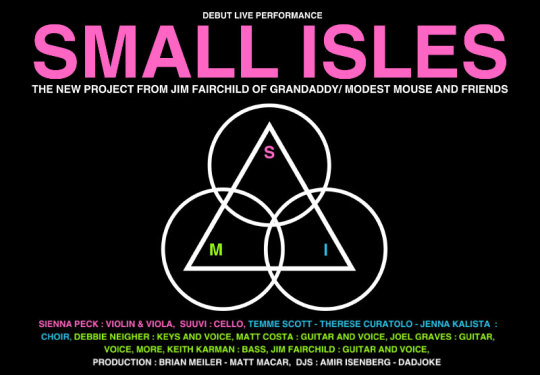
SILY: When I last spoke with you, you were planning a Small Isles show, or at least thinking about it. You finally played the first Small Isles show last month, as you mention. How did it go?
JF: It was super scary. I had never done anything like that. I knew I needed to get myself the actual challenge to do it, not a hypothetical looming in the distance. So I booked a show. I hit up Sienna and asked, "Can we do this? Can you put together a string section?" She took care of so much. I sent her all of the isolated parts, she recruited SUUVI, this incredible cellist, and they played a lot of double stop stuff. She contracted this copyist to do sheet music. Taylor assembled a choir. I asked her whether she knew any piano players, and she recommended Debbie Neigher, who was amazing. There was no money or rehearsal space or practice space. It's so much different than playing a rock and roll show. With Modest Mouse or Grandaddy, you practice a lot. You get familiar with the material. This band, doors were at 7:30, and there were 10 people on stage, and nobody played a note of music until 6. It was the first time I heard this ensemble make sound together. They just knew how to do it.
Joel Graves and Matt Costa, both of whom I've known for a long time, played guitar, so I felt comfortable. But a lot of these people I never met until that night. The show wound up being really good. It's totally all bound to them. They came in and knew the stuff. They seemed excited about doing it together and potentially excited to do more.
For "The Rest is History", the final song on Everything on Memory, I had to have sub-tracks there, because we didn't have a drummer. I had these Pro Tools sessions I had made. It was a crazy amount of work. We worked for weeks. Part of it was in 3/4, and there was this piano melody in 5/4 against the 4/4 of the song. I played it one time and had to go through and adjust everything in MIDI to make it make sense for the rest of the ensemble. I played it on loop because I thought there was no way anybody could possibly play it. During practice, we started to play it, and Debbie says, "Hey Jim, I can play that part. I learned it!" I was super apprehensive. In my head, I thought, "There's no way she can play this." It was me geeking out for a day in a half to construct a piano part. And she fucking nailed it! It made me certainly happy and expanded my concept of scoring these imaginary movies. There's so many places to go from here. I've been doing this for so long now that in the worst moments, you think, "What am I gonna do now?" But you haven't cracked open even a fraction of what you can do musically.
I didn't really get to talk to any of Taylor's choir. I had this crazy intense experience with these people musically and then said, "Thanks guys, later!"
SILY: Where do you go from here?
JF: I want to play more shows. Matt Costa recorded the show, so we're looking to send it to some booking agents. I hope people didn't tell me it was good just because they were my friends. A lot of folks seemed really taken by it. It was a unique show, with rock instrumentation but a choir and strings. As I'm working on some additional film scores right now, I have the kernels some imaginary scores. One is a summer movie, and one is a December sort of release. I have them in my head, so I'm starting to make the music for those. I want to get the team assembled for what those will hopefully become, and record them so they're done by the time spring rolls around.
SILY: I'm glad to hear you finally played live. That's where "music as problem solving" usually comes into play, but it seems like your show was the more seamless endeavor than your studio recording!
JF: It was, all down to them. They just fucking knew it. We played three songs from Out in The Sunset and five from Everything on Memory, and we only sound-checked each once. [laughs] It gave me a lot of optimism. I have this idea in my head that there's a lot of places to go musically, and sometimes you're just telling yourself that as an aspiration, but it turns out it's actually true. It's amazing.
youtube
#interviews#small isles#modern recordings#bmg#hotel cafe#everything on memory#dustin aksland#jim fairchild#modest mouse#grandaddy#jacob snider#the valley the mountains the sea#rick moody#the ice storm#ang lee#sienna peck#out in the sunset#joe talbot#the last black man in san francisco#donald glover#stephen glover#christopher nolan#terrence malick#jason lytle#strangers to ourselves#isaac brock#atlanta#the tree of life#the sophtware slump#circuit city
0 notes
Text





The Last Black Man In San Francisco (2019)
dir. joe talbot
#the last black man in san francisco#joe talbot#movie#movie still#interior design#jonathan majors#cinema#cinemetography
6 notes
·
View notes
Photo
@intraosseous
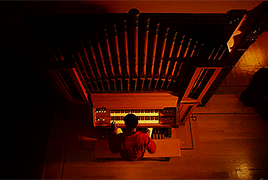





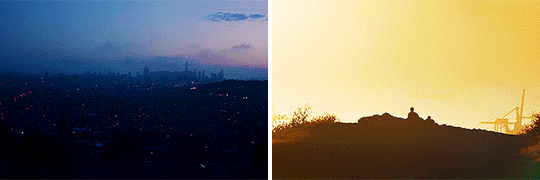
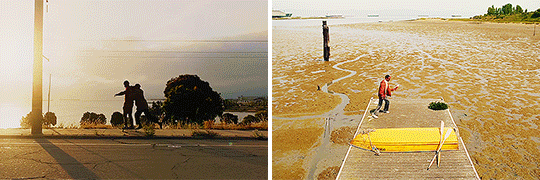
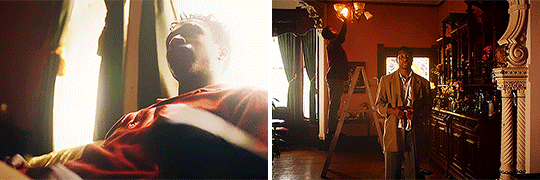
“Let us give each other the courage to see beyond the stories we were born into!” The Last Black Man in San Francisco (2019) Directed by Joe Talbot
138 notes
·
View notes
Text
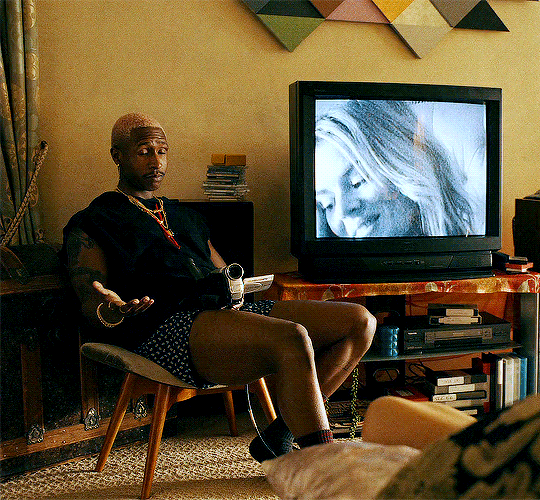
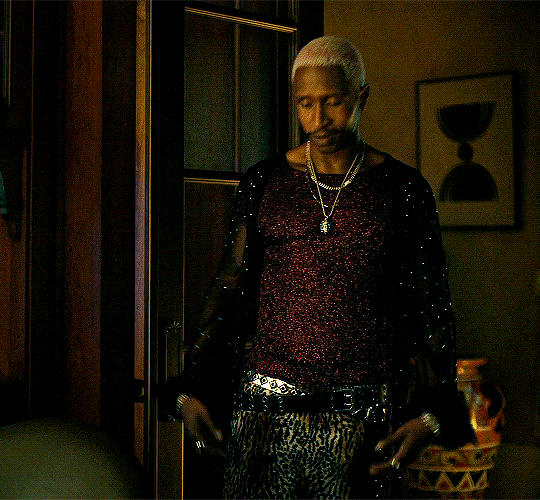
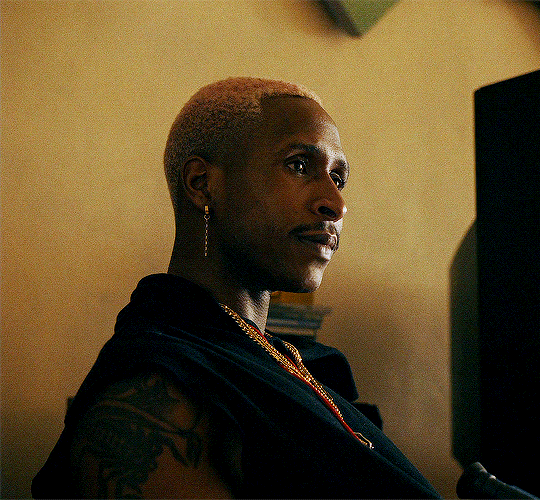



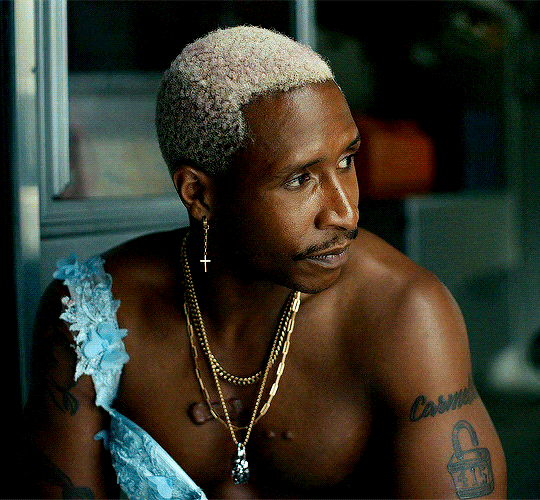
Jimmie Fails in Borderline (2025) dir. Jimmy Warden
#jimmie fails#borderline#borderline 2025#filmedit#dailyflicks#mancandykings#*#he should have better roles after the last black man in san francisco#but i'll take it
116 notes
·
View notes
Text
Okay from my movie list the ones that have a lower percentage of people who have seen them but are genuinely like So Good and not just some of my Favorites:
The Watermelon Woman (1996) - This and Desert Hearts are THE two definitive lesbian movies of all time to me. Really really good meta-exploration of the importance of Stories (AND absolutely incredible 90s lesbian fashion)
Bringing Up Baby (1938) / The Philadelphia Story (1940) / His Girl Friday (1940) / The Thin Man (1934) - these are SUCH classics of the screwball comedy genre, in which you get to watch the most charming men & woman in the world talk really fast & drive each other crazy & ultimately fall in love. You will have the time of your life!
Seven Samurai (1954) - Toshiro Mifune is THE actor of all time and you will not be able to take your eyes off him the entire time he is on screen. Also this movie is a classic of the samurai genre for a reason (and it's what The Magnificent Seven is based on, if that matters to you).
First Cow (2019) / Shoplifters (2018) / Harvey (1950) - okay these might not seem like they go together but these are the three movies of my life that have made me feel like my heart is going to burst out of my chest with love for humanity
Night of the Living Dead (1968) - Once again, a classic for a reason. It kind of invented Zombies (not joking). It's a huge influence on Halloween & Friday the 13th & A Nightmare of Elm Street & modern horror in general. It's about race in America. It's about ordinary people in an ordinary town facing horror & was kind of one of the first films to ever do it.
A Night at the Opera (1935) / Duck Soup (1933) - if you are a MASH/Alan Alda fan watch this and you will go "Oooooooh that's where he gets it from." Groucho Marx was THE foundation of comedy to me (and many other people twice my age) <3
Orpheus (1950) - Such a weird and cool retelling of Orpheus that is about mirrors & radios & stories & dares to ask the question, "What if death was hot?"
Kajillionaire (2020) - You neeeeed to watch Evan Rachel Wood and Gina Rodriguez be gay together (NOT clickbait) & this love letter to absurd and awkward humans figuring out how to exist in the world
Minari (2020) - Just a really lovely, intimate character portrait of a family, my exact favorite kind of movie that you will love if you also like that kind of thing
The Seventh Seal (1957) - really good if you want to watch a Swedish guy play chess with death (you do)
The Tale of Zatoichi (1962) - Watch these men be gay together (subtext. heartbreaking. COMPELLING.)
The Sting (1973) - You want to watch Paul Newman & Robert Redford be gay together while seeing if they can pull off an absolutely BONKERS heist. You just do!!
#not that everyone needs more movie recommendations with like one billion movie lists going around rn but i can't help it! just a list here#for anyone who wants it cause i love these movies and you might too#also the last black man in san francisco is so so good but well the situation with jonathan majors now makes it hard to recommend
9 notes
·
View notes